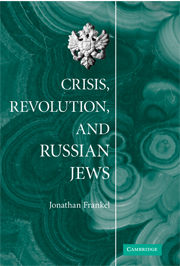Book contents
- Frontmatter
- Contents
- Acknowledgments
- Introduction
- PART I NEW DYNAMICS?
- PART II REVOLUTION AND WAR (1905–1921)
- 3 Jewish Politics and the Russian Revolution of 1905
- 4 “Youth in Revolt”: An-sky's In Shtrom and the Instant Fictionalization of 1905
- 5 Yosef Haim Brenner, the “Half-Intelligentsia,” and Russian-Jewish Politics (1899–1908)
- 6 The Paradoxical Politics of Marginality: Thoughts on the Jewish Situation during the Years 1914–1921
- PART III IDEOLOGICAL CONFLICT AND CONTINUITY
- PART IV OVERSEAS
- PART V HISTORY AND THE HISTORIANS
- Index
3 - Jewish Politics and the Russian Revolution of 1905
Published online by Cambridge University Press: 07 August 2009
- Frontmatter
- Contents
- Acknowledgments
- Introduction
- PART I NEW DYNAMICS?
- PART II REVOLUTION AND WAR (1905–1921)
- 3 Jewish Politics and the Russian Revolution of 1905
- 4 “Youth in Revolt”: An-sky's In Shtrom and the Instant Fictionalization of 1905
- 5 Yosef Haim Brenner, the “Half-Intelligentsia,” and Russian-Jewish Politics (1899–1908)
- 6 The Paradoxical Politics of Marginality: Thoughts on the Jewish Situation during the Years 1914–1921
- PART III IDEOLOGICAL CONFLICT AND CONTINUITY
- PART IV OVERSEAS
- PART V HISTORY AND THE HISTORIANS
- Index
Summary
The Russian Revolution of 1905 belongs together with 1881 and 1917 as a period of crucial importance in the development of modern Jewish politics. Ideological ferment; a remarkable upsurge in political activity, organization and recruitment; the creation of new leadership elites; mass involvement – such was the Jewish response to each of these three periods of sudden crisis. Even though modernization was fast and deeply transforming Russian Jewry from the middle of the nineteenth century, these explosive reactions seem (in part at least) to have been fired by the messianic longings traditionally so central a feature of the popular consciousness of East European Jewry. To that extent, 1881, 1905 and 1917 belong not only together but also, for example, with 1665–66.
However, over and beyond its place in this recurring cycle, the crisis of 1905–7 brought the development of modern Jewish politics to a new stage.
If the Damascus Blood Libel of 1840 first impelled leaders of Western – post-Emancipation – Jewry to take up the Jewish cause abroad i areas of pre-Emancipation; if the year 1881 initiated the modern political organization of Russian Jewry – a process which eventually produced the proto-Zionist Hibat Zion movement in 1884; the first Jewish agricultural colonies in Palestine; the Yiddish-speaking labour movement in England and the United States; and the Bund in 1897; it was the 1905 revolution which first brought these (and additional) forces together into a dynamic, complex system of interaction, of competition and cooperation, of mutual repulsion and mutual attraction.
- Type
- Chapter
- Information
- Crisis, Revolution, and Russian Jews , pp. 57 - 71Publisher: Cambridge University PressPrint publication year: 2008
- 1
- Cited by



